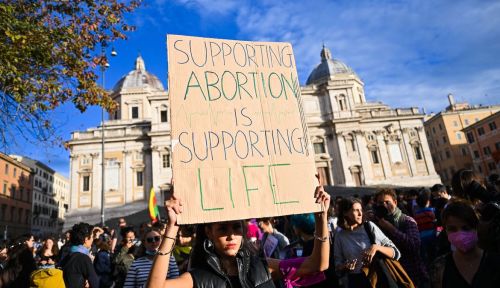State abortion laws have been in flux since the Supreme Court’s June decision to overturn Roe v. Wade, the 1973 ruling codifying the right for people to receive abortions under the 14th amendment. In Idaho, students are finally facing the consequences of this legislation this week as universities warn their staff members that helping students find abortion clinics or recommending emergency contraceptives could earn them a felony under a new state law.
The “No Public Funds for Abortion Act,” a 2021 law, prohibits professors from “promoting” abortion services to their students. However, it’s not the only law making it more difficult for university-goers to seek reproductive care. As PBS News Hour notes, a series of older laws written long ago are now going into effect, one by one, in Idaho (as in many other states).
For example, one 1867 law that was written before Idaho even became a state (and updated in 1974) prohibits all advertising or administering of abortion services or birth control methods, like condoms and birth control. This sparked the administration at the University of Idaho to advise that condoms should only be given out to students to protect against sexually transmitted infections (STIs), and never to prevent pregnancies.
Questions still remain regarding if, and how, technology will be used to surveil state employees who may be offering reproductive health advice on their state-owned computers.
“This is a challenging law for many and has real ramifications for individuals in that it calls for individual criminal prosecution,” said Jodi Walker, spokeswoman for the University of Idaho, in an email to the school. “The section does not specify what is meant by promoting abortion, however, it is clear that university employees are paid with public funds. Employees engaging in their course of work in a manner that favors abortion could be deemed as promoting abortion.”
Of course, reproductive rights are also a topic that comes up in classroom settings as part of the law and medical curriculum—and institutions like Boise University and Idaho University are still trying to figure out how these laws will affect how necessary information is taught in the classroom. For example, what will a lesson on ectopic pregnancies—or pregnancies where a fertilized egg gets stuck on the way to a uterus, thus endangering the mother—look like? How do you talk about the 14th amendment without also talking about abortion?
For now, university professors have been encouraged to remain “neutral” on tricky subjects whenever possible—a near impossible task. “If the science says the right thing to do is to provide birth control in this patient, is presenting that information neutral?” said Lisa Bostaph, PhD, a criminal justice professor at Boise State University.
If you, or someone you know in Idaho, need information about how to receive abortion care or birth control, visit abortionfinder.org or check out the Reproductive Health Access Project. If you’re part of an underserved community and need transportation to receive an abortion, contact the folks at the Brigid Alliance.
Sign Up for Our Daily Newsletter
Get all the latest in wellness, trends, food, fitness, beauty, and more delivered right to your inbox.
Got it, you've been added to our email list.











